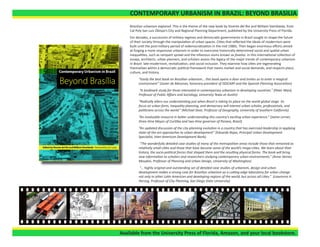Contemporary Urbanism In Brazil
- 1. CONTEMPORARY URBANISM IN BRAZIL: BEYOND BRASILIA Brazilian urbanism explored. This is the theme of the new book by Vicente del Rio and William Siembieda, from Cal Poly San Luis Obispo’s City and Regional Planning Department, published by the University Press of Florida. For decades, a succession of military regimes and democratic governments in Brazil sought to shape the future of their society through the manipulation of urban spaces. Cities that reflected the ideals of modernism were built until the post-military period of redemocratization in the mid 1980s. Then began enormous efforts aimed at forging a more responsive urbanism in order to overcome historically determined social and spatial urban inequalities, such as rampant sprawl and the infamous slums known as favelas. In this international collection of essays, architects, urban planners, and scholars assess the legacy of the major trends of contemporary urbanism in Brazil: late-modernism, revitalization, and social inclusion. They examine how cities are regenerating themselves within a democratic political framework that meets market and social demands, and respects place, culture, and history. “Easily the best book on Brazilian urbanism... this book opens a door and invites us to enter a magical environment” (Javier de Mesones, honorary president of ISOCARP and the Spanish Planning Association). “A landmark study for those interested in contemporary urbanism in developing countries.” (Peter Ward, Professor of Public Affairs and Sociology, University Texas at Austin) “Radically alters our understanding just when Brazil is taking its place on the world global stage. Its focus on urban form, inequality planning, and democracy will interest urban scholar, professionals, and politicians across the world.” (Michael Dear, Professor of Geography, University of Southern California) “An invaluable resource in better understanding this country’s exciting urban experience.” (Jaime Lerner, three-time Mayor of Curitiba and two-time governor of Parana, Brazil) “An updated discussion of the city-planning evolution in a country that has exercized leadership in applying state-of-the-art approaches to urban development” (Eduardo Rojas, Principal Urban Development Specialist, Inter-American Development Bank). “The wonderfully detailed case studies of many of the metropolitan areas include those that remained as relatively small cities and those that have become some of the world’s mega-cities. We learn about their history, the socio-political forces that shaped them and the resulting physical forms. The book will bring new information to scholars and researchers studying contemporary urban environments.” (Anne Vernez Moudon, Professor of Planning and Urban Design, University of Washington) “... highly original and outstanding set of detailed case studies of urbanism, design and urban development makes a strong case for Brazilian urbanism as a cutting edge laboratory for urban change not only in other Latin American and developing regions of the world, but across all cities.” (Lawrence A. Herzog, Professor of City Planning, San Diego State University) Available from the University Press of Florida, Amazon, and your local bookstore.

